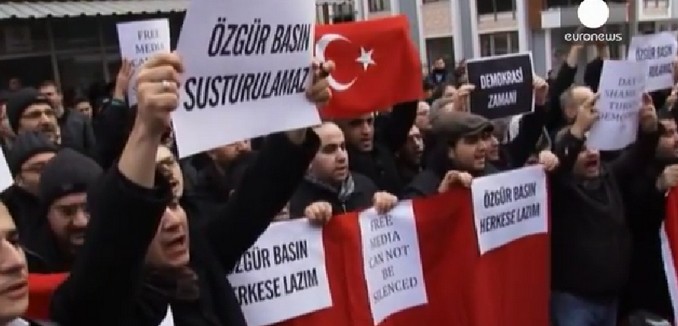In a crackdown against domestic opposition, the Islamist government of Turkish President Recep Tayyip Erdogan arrested over thirty people yesterday, including the editor of the country’s most popular newspaper, as well as other “police officers, journalists and media workers.”
The New York Times reports:
Eight other people were on a list of suspects accused of “using pressure, intimidation, threats,” a “smear campaign” and “fabrication of evidence” to claim the power of state as members of an illegal organization, the semiofficial press agency Anadolu reported. Mr. Erdogan has said that the organization’s members are part of a parallel structure within the state that is intended by the cleric, Fethullah Gulen, to oust him from power.
Some members of the news media were also charged with “fabricating charges and evidence” in their productions to support a 2009 investigation, eventually dropped by prosecutors, that accused a group of people of being radical Islamists, the report said.
This is just the latest assault on a free press by Erdogan’s government. Earlier this year, Turkey was rated “not free” by Freedom House on account of its previous crackdowns on the media. The government has fired or re-assigned hundreds of police officers who were deemed to be linked to Gulen. Last year, the Erdogan government asserted fuller control of the military. In October, the government granted itself sweeping powers, including greater control over the judiciary.
Mahir Zeynalov, a journalist who was deported from Turkey earlier this year for tweeting criticisms of the government, has been covering the crackdown on Twitter.
Editor-in-chief of Turkey's most popular newspaper arrested… for reporting corruptionhttp://t.co/XoOtXNNiln pic.twitter.com/Dh0Xr6uSZe
— The Independent (@Independent) December 14, 2014
Our reporters in Germany display solidarity in the face of government crackdown on our newspaper pic.twitter.com/LGd7aQCakT
— Mahir Zeynalov (@MahirZeynalov) December 14, 2014
When you arrest soap opera producers for trying to overthrow the government, there's nothing you can do to reclaim your grip on reality.
— (((Michael Koplow))) (@mkoplow) December 14, 2014
The only people tarnishing #Turkey 's reputation are President Erdogan, Prime Minister Davutoglu and their supporters.
— Steven A. Cook (@stevenacook) December 14, 2014
The Turkish government’s assault on the free press is not new. In Has Turkey Betrayed the West?, which was published in the May 2013 issue of The Tower Magazine, Jamie Kirchick wrote:
On September 8, 2006, a group of undercover policemen arrested Füsun Erdogan (no relation to the Prime Minister) in broad daylight, forced her into a car, and drove her to an isolated house where she was made to lie on the floor, blindfolded. As the founder of a radio station critical of the government, she was indicted for “attempting to change the constitutional order by force” because of her alleged membership in the banned Marxist Leninist Communist Party. The only evidence against her was not unsealed until months later, and it was dubious in the extreme: a list of party members that includes her name, which her lawyers claim is a fake. She remains in jail to this day—over six years of provisional detention—and underwent an operation for thyroid cancer last November.
Füsun Erdogan is not alone. In its battle with opposition media, the Turkish government heavily abuses the practice of detention without trial. Over 75 percent of the country’s jailed journalists, according to the Committee to Protect Journalists (CPJ), were detained while awaiting trial or verdict. Several have been charged under the umbrella of the Ergenekon case, an ongoing investigation into an allegedly vast conspiracy involving media personalities, politicians, and generals to overthrow the government in a military coup. Thus far, nearly 150 people have been jailed on charges of being party to the plot. Last year, the government arrested the former chief of the military staff, Ilker Basbug, on allegations that he, too, was involved in the scheme, despite having retired two years prior.” The notion that [Basbug] headed a terrorist organization just strains credulity,” Eric Edelman, the former American Ambassador to Turkey, told The Economist.
[Photo: euronews (in English) / YouTube ]




